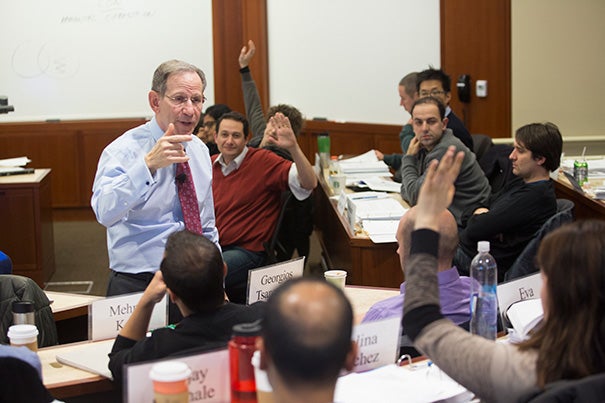
During a HKS January course, Professor Gary Orren taught his students “one of the most important 15 minutes in U.S. history most Americans know nothing about.”
Jon Chase/Harvard Staff Photographer
One course, two weeks, lessons for life
Harvard Kennedy School students embrace January courses
You wouldn’t know by the spirited discussion in crowded Starr Auditorium that it was a late Friday morning in January, the period between academic semesters, a time when students traditionally leave the Harvard Kennedy School (HKS) campus to visit family and friends.
The students who chose to remain in Cambridge over the winter break to squeeze in another course prior to the start of the spring semester were focused on what Gary Orren, V.O. Key Jr. Professor of Politics and Leadership, argued was “one of the most important 15 minutes in U.S. history most Americans know nothing about.”
Orren was referring to Col. Joshua Lawrence Chamberlain’s inspirational “sermon” given to approximately 120 mutinous soldiers from the 20th Maine regiment moments before heading into the Battle of Gettysburg in 1863.
As Orren explained, Chamberlain’s speech had a significant impact on the battle, and was a case study of persuasion worthy of emulation by students enrolled in his January-term (J-term) course, “Persuasion: The Science and Art of Effective Influence.” Orren’s course was one of 16 J-term courses offered at HKS, all of which gave students a unique opportunity to earn an additional course credit in just two weeks.
“The J-term also offers much more time and space to accommodate every type of experiential and conventional learning — extended role-play simulations, classroom exercises, small group breakouts, videos, and lecture/discussions,” said Orren. “The J-term is ideal for a course like mine where students are developing and honing practical professional skills, breaking old habits, and experimenting with and acquiring new ones.”
All HKS J-term courses met five days a week; most began at 8 or 9 a.m. and continued until 5 or 6 each night.
“It’s pretty intense, but the great thing about it is that you can really dive into something and do it on a focused basis. During the regular term you have the distraction of having to juggle four different classes at the same time with all the assignments and readings. But here you really get to zero in, so I kind of like that,” said Dorothy Tuma, M.C./M.P.A. ’14.
Echoing her comments was Caleb Phillips, M.P.P. ’15, who described it as a “much more immersive, engaging experience.”
“I didn’t expect the workload and the pace,” said Jiaoli Chen, M.C./M.P.A. ’14.
“It takes a lot of time for preparation; there is a lot of classroom discussion, and a lot of homework. Overall I think it’s quite effective.”
This year’s J-term course list included “Leadership for a Livable City,” taught by David Gergen, public service professor of public leadership; “Inclusive Security” with Swanee Hunt, Eleanor Roosevelt Lecturer in Public Policy; and “Advance Workshop in Multiparty Negotiation and Conflict Resolution” with Brian Mandell, senior lecturer in public policy.
Most of the courses met on campus, but a few, such as “Community Recovery: Rebuilding Disaster-Damaged Communities in Chile,” taught by Doug Ahlers, submerged students in fieldwork. In previous years classes have traveled to New Orleans post-Hurricane Katrina, and to Chile following 2010’s devastating 8.8-magnitude earthquake to help residents rebuild their communities.
“We call it an immersive learning experience,” said Ahlers, a senior fellow at the Belfer Center and adjunct lecturer in public policy. “We’re taking classroom-learned skills and applying them in a real-world setting where time is short, the stakes are high, and real people are counting on us. In situations like these, I’ve found that Kennedy School students always rise to the occasion.”
While Chamberlain had 15 minutes to practice the principles of persuasion, the students in Orren’s course had two weeks to try to master them.
“I think J-term is good for some particular courses which can really develop your skill set within a short time,” said Chen.
“It’s the kind of learning that sticks,” added Orren.




